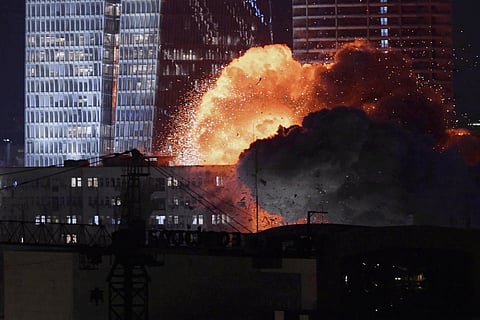

Iran has threatened to strike the regional military bases of three Western allies US, UK and France, if they helped stop its retaliatory strikes on Israel.
"Any country that participates in repelling Iranian attacks on Israel will be subject to the targeting of all regional bases of the complicit government, including military bases in the Persian Gulf countries and ships and naval vessels in the Persian Gulf and the Red Sea by Iranian forces,” said a government statement quoted by Iran’s semiofficial Mehr news agency.
Iran on Saturday launched retaliatory missile strikes on Israel killing at least three people and injuring dozens, after Tel Aviv targeted Tehran's nuclear facilities and military assets in airstrikes that killed at least 78 people, including 20 children.
Iran’s Supreme Leader Ayatollah Ali Khamenei had vowed on Friday that those behind the Israeli strikes would not “escape safely” from their “great crime.”
Israel has also warned of more strikes on Iran.
Israel's Ben Gurion International Airport has been closed until further notice, AFP reported on Saturday.
"There is no date or day set to reopen the airport," airport spokeswoman Lisa Diver said.
Meanwhile, multiple media reports have suggested that Israeli Prime Minister Benjamin Netanyahu has been moved to a different location outside the occupied territories, reportedly in Greece, fearing Iran's retaliatory strikes.
The Jerusalem Post on Friday reported that the 'Wing of Zion', the aircraft which serves Netanyahu and Israeli President Isaac Herzog as their official vessel of transportation during international visits, "departed for Athens on Friday morning amid fears of an Iranian retaliatory attack."
Israel's attack on Iran on Friday killed Iran's highest-ranking military officer, armed forces chief of staff Mohammad Bagheri, and the head of the Revolutionary Guards, Hossein Salami, Iranian media reported.
Khamenei swiftly appointed new commanders to replace those killed.
Iran confirmed that the Guards' aerospace commander had been killed, along with "a group of brave and dedicated fighters."
The state media reported six nuclear scientists were also among the dead.
Iran retaliated by launching drones and later firing waves of ballistic missiles at Israel, where explosions lit the night skies over Jerusalem and Tel Aviv and shook the buildings below. The Israeli military urged civilians, to head to shelter for hours.
After a day of back-and-forth bombardments, UN Secretary-General Antonio Guterres called for an immediate ceasefire between the two nations. “Enough escalation. Time to stop. Peace and diplomacy must prevail,” he wrote on X late Friday.
In a sharp response, Iran—without directly naming the UN chief—dismissed the appeal, stating, “If you were silent during two years of Palestinian massacres and last night’s attack on Iran, don’t call for restraint now. Stay quiet.”
Countries in the region condemned Israel’s attack, while leaders around the globe called for immediate deescalation from both sides.
Israel’s strikes have also cast serious doubt over upcoming nuclear talks between the United States and Iran, scheduled for Sunday in Oman, the Associated Press reported. In the wake of the attacks, Iran’s Foreign Ministry spokesman declared that further negotiations with the U.S. had become “meaningless.”
“The U.S. did a job that made the talks become meaningless,” ministry spokesman Baghaei was quoted as saying on state television, accusing Israel of crossing all of Iran’s red lines by committing a “criminal act.”
While he condemned the strikes, Baghaei stopped short of confirming a cancellation of the talks. According to Mizan, Iran’s judiciary-run news agency, he said: “It is still not clear what we decide about Sunday's talks.”
Israel had long threatened such a strike, and successive American administrations sought to prevent it, fearing it would ignite a wider conflict across the Middle East.
(With inputs from AP, AFP)